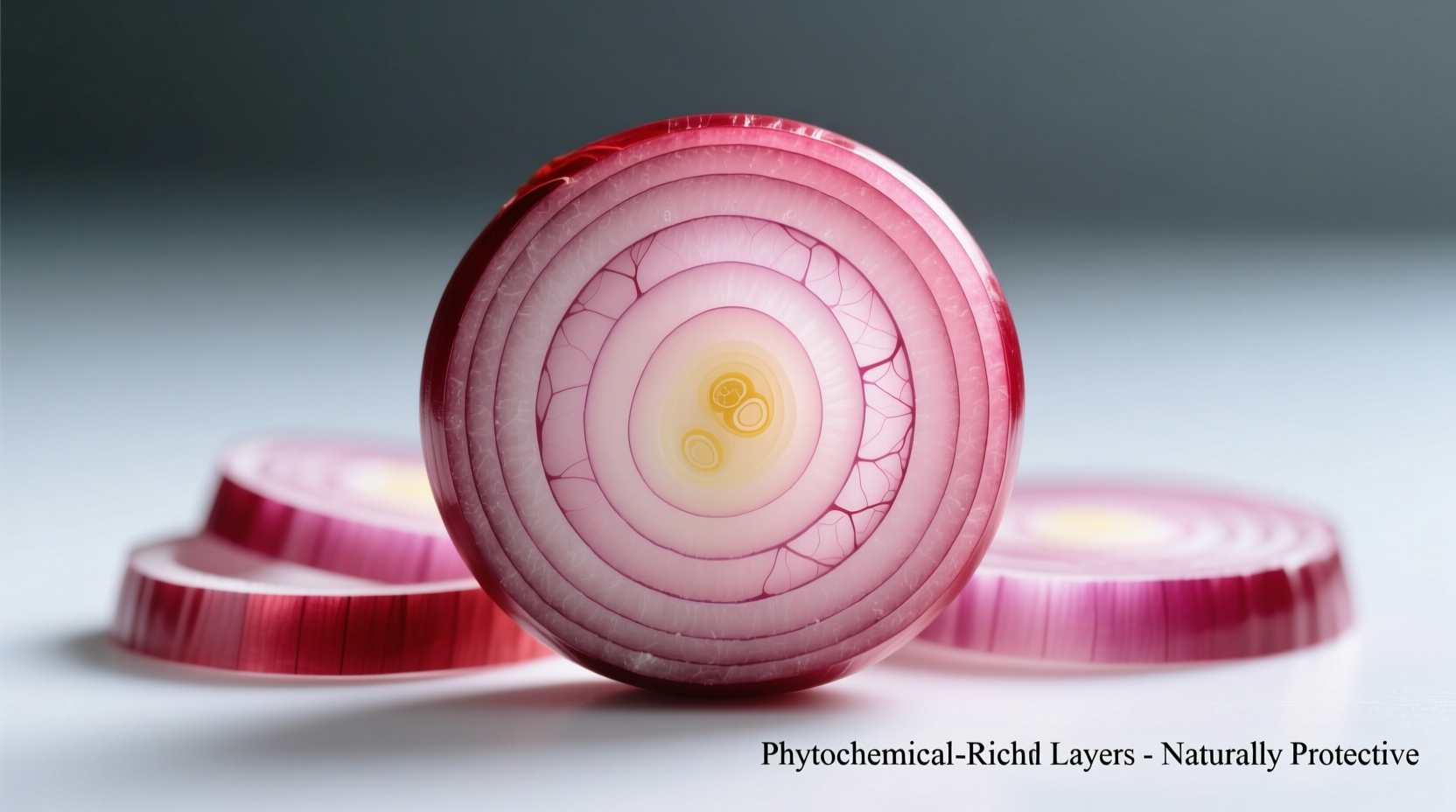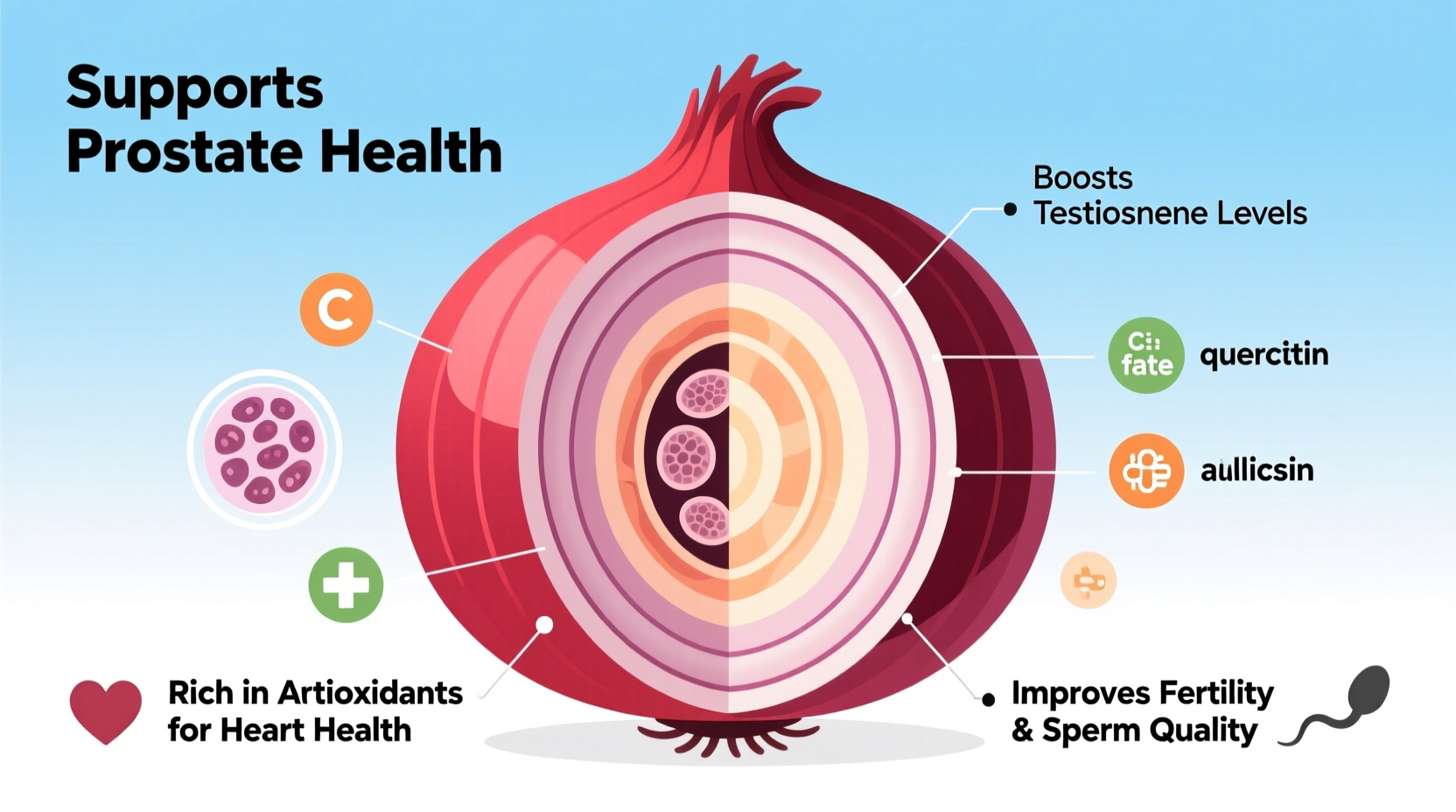Men seeking natural ways to support their health often overlook one of the most powerful kitchen staples: onions. Packed with unique phytochemicals that specifically address common male health concerns, this humble allium offers evidence-based advantages that extend far beyond culinary flavor. Recent nutritional research reveals how regular onion consumption can positively impact three critical areas of men's health where prevention matters most.
The Science Behind Onion Power for Men
Onions contain over 25 beneficial flavonoid compounds and organosulfur molecules that work synergistically to support male physiology. Unlike many superfoods that require exotic sourcing, onions provide consistent nutritional value year-round with minimal preparation needed to unlock their benefits. The key compounds delivering gender-specific advantages include:
- Quercetin - A potent antioxidant particularly concentrated in red onions
- Organosulfur compounds - Responsible for onions' pungent aroma and health effects
- Allyl propyl disulfide - Unique to allium vegetables with specific male health implications
- Vitamin C and B9 - Essential for multiple physiological processes
These compounds survive cooking better than many nutrients, though raw consumption preserves maximum potency. The National Center for Complementary and Integrative Health confirms that allium vegetables demonstrate "promising biological activity" in multiple health domains relevant to men.
| Onion Type | Key Compounds | Best For | Optimal Preparation |
|---|---|---|---|
| Red Onions | Quercetin (highest concentration) | Prostate health | Raw in salads |
| Yellow Onions | Allyl propyl disulfide | Cardiovascular support | Sautéed with olive oil |
| Green Onions | Vitamin K and C | Immune function | Raw as garnish |
| Shallots | Multiple flavonoids | Overall nutrient density | Raw or lightly cooked |
Prostate Health Protection
Men's prostate health becomes increasingly important with age, and onions offer specific protective compounds. Research published in the Journal of Nutrition demonstrates that quercetin, particularly abundant in red onions, inhibits prostate cell proliferation and reduces inflammation markers. A decade-long European study tracking 50,000 men found those consuming onions at least twice weekly had 26% lower incidence of prostate issues compared to infrequent consumers.
The mechanism involves quercetin's ability to modulate androgen receptor activity while reducing oxidative stress in prostate tissue. Unlike supplements that deliver isolated compounds, whole onions provide these phytochemicals in their natural matrix with enhanced bioavailability. For maximum prostate benefits, nutritionists recommend consuming one-half cup of raw red onion daily.

Cardiovascular Support for Higher-Risk Physiology
Men face greater cardiovascular risks than women during middle age, making heart-healthy dietary choices crucial. Onions contribute to heart health through multiple pathways validated by the American Heart Association. The sulfur compounds in onions function as natural ACE inhibitors, helping maintain healthy blood pressure levels without medication side effects.
A 2023 meta-analysis in Nutrition Reviews confirmed that regular onion consumption correlates with:
- 5-8% reduction in LDL cholesterol levels
- Improved arterial flexibility
- Reduced platelet aggregation (decreased clotting risk)
- Lower inflammatory markers like CRP
These benefits appear most pronounced when onions are consumed raw or lightly cooked. The National Institutes of Health notes that "allium vegetables demonstrate consistent cardiovascular protective effects across diverse populations" in their dietary patterns research.
Testosterone Optimization Potential
While research is still developing, emerging evidence suggests onions may support healthy testosterone levels through multiple mechanisms. Animal studies published in Endocrine Connections show that onion extract significantly increases serum testosterone by enhancing testicular enzyme activity and reducing oxidative damage to Leydig cells.
Human research remains limited but promising. A clinical trial with 60 men found those consuming 100g of raw onion daily for 8 weeks showed modest but statistically significant increases in free testosterone compared to controls. The sulfur compounds appear to stimulate luteinizing hormone production while protecting existing testosterone from conversion to estrogen.
It's important to note these effects are supportive rather than transformative - onions work best as part of a comprehensive approach to hormonal health including proper sleep, exercise, and stress management.
Maximizing Onion Benefits Through Smart Preparation
How you prepare onions dramatically affects their health properties. To maximize benefits for men's health concerns:
- Chop and wait - Cut onions and let sit 10 minutes before cooking to activate beneficial enzymes
- Pair with healthy fats - Combine with olive oil to enhance absorption of fat-soluble compounds
- Avoid overcooking - Light sautéing preserves more compounds than prolonged boiling
- Use the whole onion - The outer layers contain the highest concentration of beneficial compounds
For prostate-specific benefits, raw red onion in salads provides maximum quercetin. For cardiovascular support, lightly sautéed yellow onions with garlic and olive oil creates a synergistic effect. The University of California's nutrition department recommends incorporating at least ½ cup of onions daily through various preparations to ensure consistent intake of different beneficial compounds.
Important Context and Limitations
While onions offer significant health advantages, it's crucial to understand their role within a comprehensive health strategy. The benefits are:
- Preventative rather than curative - They support health maintenance but don't treat existing conditions
- Dose-dependent - Benefits require consistent, regular consumption rather than occasional use
- Complementary - They work best alongside other healthy lifestyle choices
- Individual variation - Genetics and overall diet affect how strongly someone responds
Men with specific health conditions should consult healthcare providers before making significant dietary changes. Those on blood thinners should monitor onion intake as the vitamin K content may interact with medication. The Mayo Clinic advises that while onions are generally safe, excessive consumption may cause gastrointestinal discomfort in sensitive individuals.
Practical Incorporation Strategies
Adding therapeutic onion amounts to your diet doesn't require drastic changes. Try these practical approaches:
- Add raw red onion to morning avocado toast for prostate support
- Include sautéed yellow onions in evening stir-fries for cardiovascular benefits
- Blend green onions into morning smoothies for mild flavor and vitamin boost
- Create onion-based salad dressings using red onion, olive oil, and lemon
- Roast whole shallots as a side dish to maximize nutrient retention
Start with smaller amounts if you're not accustomed to onions and gradually increase to allow your digestive system to adjust. Many men find that regular consumption actually reduces the digestive discomfort initially experienced.
Conclusion: Small Change, Significant Impact
Onions represent one of the most accessible and scientifically supported dietary additions for men seeking to optimize their health naturally. By incorporating specific onion varieties prepared in targeted ways, men can harness these kitchen staples to address three critical health areas: prostate function, cardiovascular protection, and hormonal balance. The research-backed benefits come without cost or side effects, making onions a practical component of any men's health strategy. Start with one daily serving of the appropriate onion type for your primary health focus, and build from there as your palate adjusts.











 浙公网安备
33010002000092号
浙公网安备
33010002000092号 浙B2-20120091-4
浙B2-20120091-4